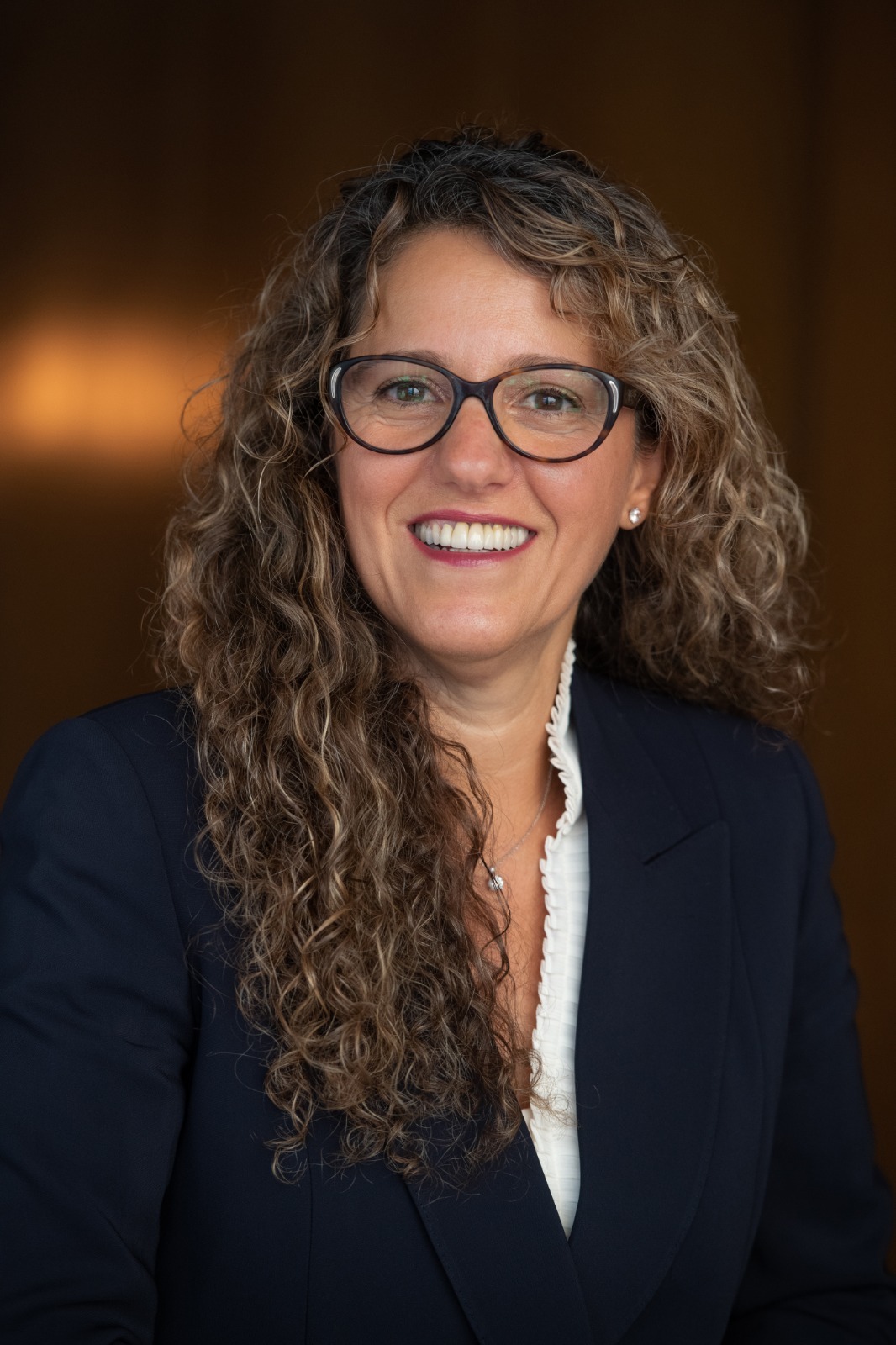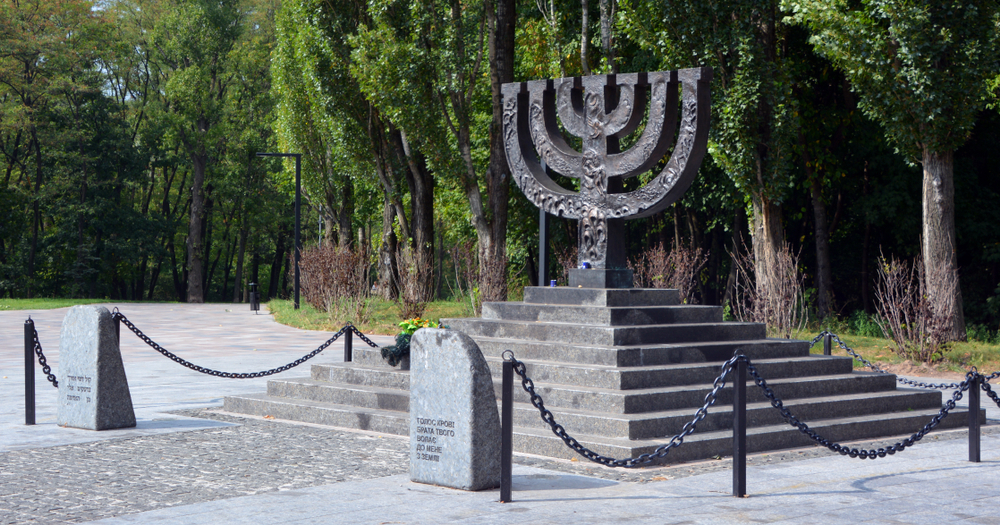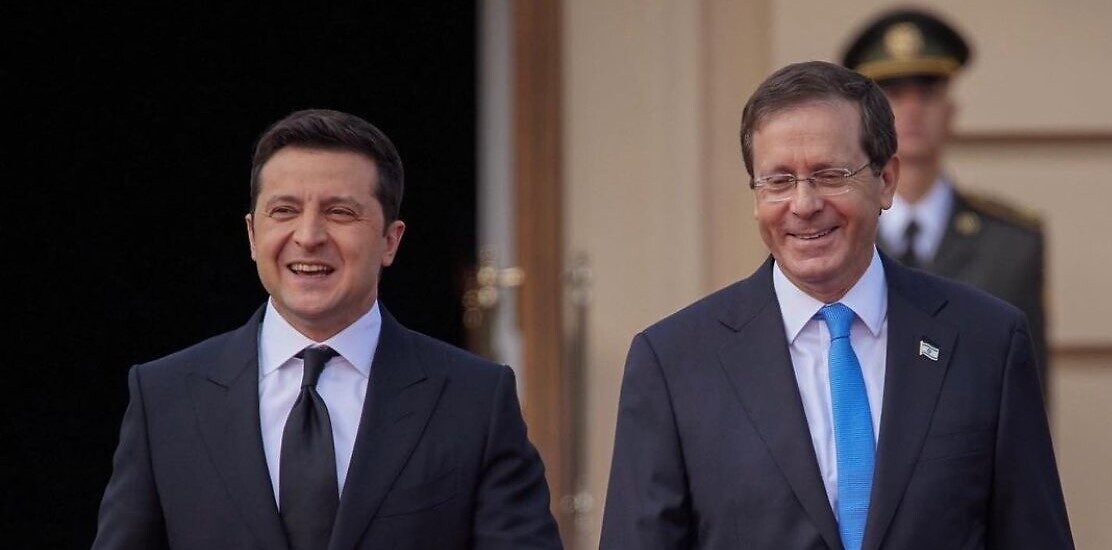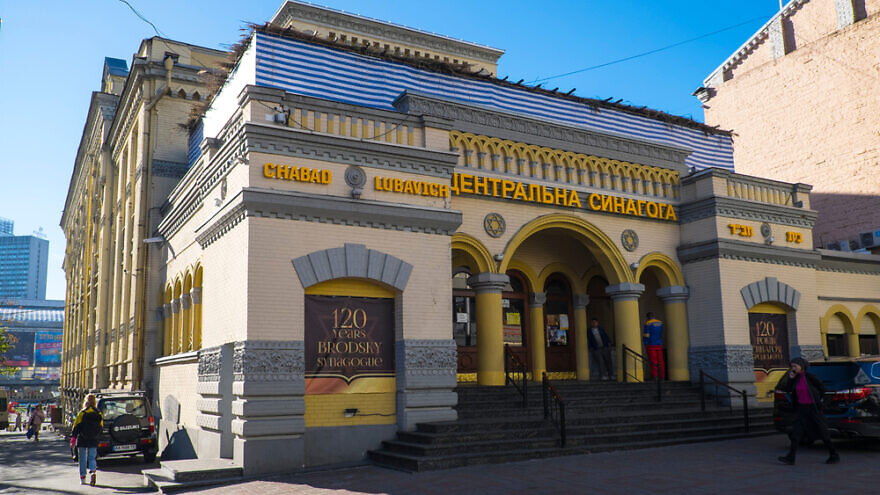Celebrating 30 years of official diplomatic relations between Israel and Ukraine, the third annual Kyiv Jewish Forum—set to take place over two days starting this Wednesday—will be held online due to ongoing coronavirus restrictions. The purpose of the event is to foster dialogue among leaders from around the globe that will help bring about much-needed solutions to challenges such as rising anti-Semitism, the growth of the anti-Israel boycott movement and the effects of the ongoing pandemic. Discussions will also center on pressing issues facing Jewish communities worldwide, and relations between Ukraine, Israel and the global Jewish community.
The two-day virtual forum will be co-hosted by the Jewish Confederation of Ukraine in partnership with the Combat Antisemitism Movement (CAM), the Center for Jewish Impact and Euro-Asian Jewish Congress. Last year, 83,000 people participated in the forum online, including 500 leaders from Ukraine, Israel, the United States and Europe.
“Jews and Ukrainians are united by more than a thousand-year history, and this history has a lot to teach us about the challenges we face today,” said Boris Lozhkin, president of the Jewish Confederation of Ukraine. “The increasing cooperation and ties between the Ukraine and Israel are to be celebrated, and together with our partners from around the world, we will discuss how to further increase collaboration and discuss solutions to anti-Semitism and the Jewish community living under COVID-19.”
Ukraine’s President Volodymyr Zelensky is expected to attend the online event, as well as its Prime Minister Denys Shmyhal, Minister of Foreign Affairs Dmytro Kuleba and Minister of Health Viktor Liashko, in addition to Israel’s Minister of Jerusalem Affairs and Housing and Construction Ze’ev Elkin, Minister of Diaspora Affairs Nachman Shai and Minister of Tourism Yoel Razvozov, among other senior leaders and officials from Europe, Israel and the United States.
Other speakers at this year’s event include Sen. Ben Cardin (D-Md.); Rep. Doug Lamborn (R-Colo.); European Commission Coordinator on Combating Antisemitism and Fostering Jewish Life Katharina von Schnurbein; Canada’s Special Envoy on Preserving Holocaust Remembrance and Combating Antisemitism Irwin Cotler; chairman of the Directorate of Yad Vashem in Jerusalem Dani Dayan; and Natan Sharansky, chairman of the Supervisory Board of the Babyn Yar Foundation and Holocaust Memorial Center.
Sonia Gomes de Mesquita, executive director of the Center for Jewish Impact, told JNS, “After three decades, our countries continue to collaborate in fields of national security, tourism, economics, public health and more. Throughout the Jewish state, Ukrainian Jews have made crucial contributions in technology, medicine and culture. This forum provides a platform to memorialize the intricate role Jews played throughout Ukrainian history and the great conciliatory lengths that Ukraine has undergone since 1991.”

‘We are facing a consolidation of several social trends’
The first day of the event will explore how Ukraine’s storied Jewish history has shaped its contemporary relations with Israel and celebrate the pivotal ties connecting Ukraine, Israel, Europe and the United States.
The second day will focus on the most-pressing issues facing the Jewish people and Israel, including challenges arising from the ongoing pandemic, the growth of anti-Semitism worldwide and the need for expanded Jewish education, among other issues. It will also look to the future of Israel’s global role as a “startup nation” and highlight the lessons that Jewish communities worldwide can learn from Israeli expertise.
Sima Vaknin, founder of Strategic Impact and senior advisor to CAM, told JNS: “Anti-Semitism, the most ancient and complex form of hatred, is an intellectual and social illness that poses an imminent challenge and a pressing danger to Jewish life and well-being.”
“Anti-Semitism is rampant across Europe and the United States, and has entered the mainstream media, academia and sometimes politics,” she said. “Unfortunately, this is not new news anymore.”
Vaknin said she is alarmed that in the last two year, “we are facing a consolidation of several social trends, global challenges, political ideologies and technological capabilities that enable anti-Semitism to spike, touch a variety of audiences and reach new peaks.”
“Medieval conspiracy theories and blood libels are coming to life with 21st-century cloaks. The defamation of the Jewish state replaced the politically incorrect Jew-hatred,” she added.
Lozhkin, who is also vice president of the World Jewish Congress, said that while the event is taking place 30 years after the advent of relations between Israel and Ukraine, “we want to take a broader look at this date.”
“The bond between Jews and Ukrainians has existed much longer—for centuries—and there were different periods in this time, as happens between any neighbors,” he noted, pointing to the tragic events that took place at Babi Yar as one such example.
In the span of just two days on Sept. 29-30, 1941, the Nazis and their Ukrainian collaborators committed one of the Holocaust’s largest (and quickest) massacres when they murdered, one by one, a staggering 33,771 Jews in Babi Yar—a massive ravine situated on the outskirts of the country’s capital of Kiev (Kyiv), Ukraine.

Lozhkin recently presented to Dayan, a new book titled Righteous Among the Nations, Ukraine.
“Among the Jews and residents of Israel, it is probably difficult to find someone who has not heard about Yad Vashem and the Righteous Among the Nations,” said Lozhkin. “As for the representatives of other peoples and residents of other countries, for them, these are not entirely obvious concepts.”
The book contains “salvation stories” that detail the enemies, victims and heroes of Ukraine during World War II.
“We decided that it would be right to tell a wider audience about the events of 80 years ago and placed 2,674 stories of the salvation of Jews by Ukrainians in the book,” said Lozhkin. “It is difficult to find a better and more correct way of communicating the truth about the Holocaust and, in general, preserving the memory of it, than by telling the specific stories.”
Lozhkin pointed out that there are likely many more stories of Ukrainians who saved Jews but their names have been lost.
Nevertheless, he said, “I think we are simply obliged to talk about each righteous person. By telling these stories, we are, at the same time, telling about the Holocaust. Truth and education are the tools that, better than others, knock the ground from under the feet of anti-Semitism. If such a book is not yet available in other countries where they officially recognize righteous people, I recommend that it be published.”
Lozhkin added that because the issue of anti-Semitism is not only about Jews, “I am happy that not only Jews will be among the guests and speakers.”
“Anti-Semitism is like a litmus test for determining the mental health of a given society,” he said. “If there is a bad attitude towards Jews, then there will almost certainly also be serious remarks in relation to other peoples, religions, cultures and to human rights in general, in a broad sense. I don’t want to say that everything begins with anti-Semitism, but it almost always ends with it.”
“The root of evil is ignorance,” he noted. “This is the third time we will be discussing this issue and, unfortunately, most likely it will not be the last. I hope that our esteemed speakers will be able to take a fresh look at the problem and suggest effective ways to neutralize or even reduce it.”

‘A reminder of how far we have come’
Another panel will highlight Israel as the No. 1 startup nation in the world.
“The time has come to learn from Israel today, and not only for Ukraine, but for the whole world,” said Lozhkin. “Being small in size and also young in comparison with [other] countries, Israel can teach a lot to everyone who wants to learn. Ukraine will definitely benefit from the Israeli experience.”
Guests and speakers of the forum will also include president of the World Jewish Congress Ronald S. Lauder; the ambassadors of Israel to Ukraine and of Ukraine to Israel Michael Brodsky and Yevgen Korniychuk; the heads of the health authorities of both countries; the U.N. and European Commission anti-Semitism commissioners; CEO of the American Jewish Committee David Harris; Euro-Asian Jewish Congress president Mikhail Mirilashvili, CEO of the Conference of Presidents of Major American Jewish Organizations William Daroff; national president and CEO of the Anti-Defamation League Jonathan Greenblatt; and many others.
Robert Singer, chairman of the Center for Jewish Impact, said: “As a Ukrainian-born Jew whose family was among the first that emigrated from Ukraine to Israel in the 1970s, I am honored to co-organize the event. I had the pleasure of being among the organizers of the 75th-anniversary ceremony of the Babyn Yar massacre. This tragic history is a reminder of how far we have come in all aspects, and I’m sure that our countries will continue to enhance these important relations in the upcoming years.”
Lozhkin said he expects the forum to reach half a million viewers around the world.
“Representation of speakers at the Kyiv Jewish Forum is growing every year, and interest in the topics discussed on our forums is also growing,” he said. “Let’s not forget about the importance of Ukraine for the Jewish world. Until the beginning of the 20th century, a quarter of all Jews in the world lived on the territory of current Ukraine. Today, descendants or immigrants from Ukraine can be found among Jews almost everywhere. In Israel alone, there are about 500,000 of them. This, among other things, can explain the increased interest in the global discussion platform, organized by us.”


























